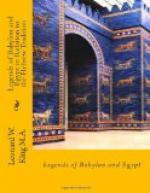(1) Cf., e.g., Skinner, A Critical and Exegetical Commentary on Genesis (1912), p. ii f.; Driver, The Book of Genesis, 10th ed. (1916), pp. 1 ff.; Ryle, The Book of Genesis (1914), pp. x ff.
In approaching this particular body of Hebrew traditions, the necessity for some caution will be apparent. It is not as though we were dealing with the reported beliefs of a Malayan or Central Australian tribe. In such a case there would be no difficulty in applying a purely objective criticism, without regard to ulterior consequences. But here our own feelings are involved, having their roots deep in early associations. The ground too is well trodden; and, had there been no new material to discuss, I think I should have preferred a less contentious theme. The new material is my justification for the choice of subject, and also the fact that, whatever views we may hold, it will be necessary for us to assimilate it to them. I shall have no hesitation in giving you my own reading of the evidence; but at the same time it will be possible to indicate solutions which will probably appeal to those who view the subject from more conservative standpoints. That side of the discussion may well be postponed until after the examination of the new evidence in detail. And first of all it will be advisable to clear up some general aspects of the problem, and to define the limits within which our criticism may be applied.
It must be admitted that both Egypt and Babylon bear a bad name in Hebrew tradition. Both are synonymous with captivity, the symbols of suffering endured at the beginning and at the close of the national life. And during the struggle against Assyrian aggression, the disappointment at the failure of expected help is reflected in prophecies of the period. These great crises in Hebrew history have tended to obscure in the national memory the part which both Babylon and Egypt may have played in moulding the civilization of the smaller nations with whom they came in contact. To such influence the races of Syria were, by geographical position, peculiarly subject. The country has often been compared to a bridge between the two great continents of Asia and Africa, flanked by the sea on one side and the desert on the other, a narrow causeway of highland and coastal plain connecting the valleys of the Nile and the Euphrates.(1) For, except




